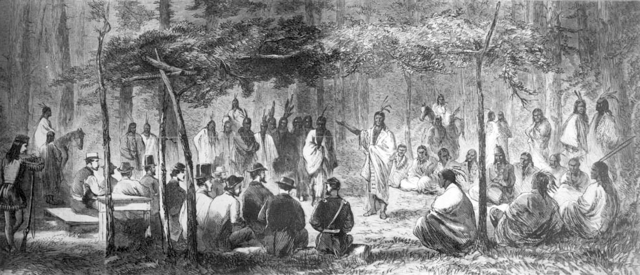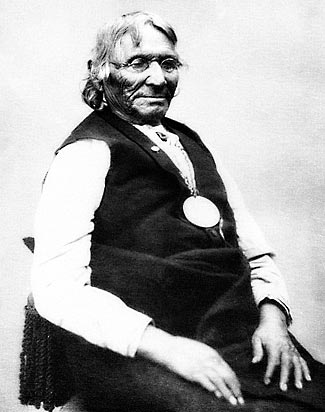
Chief Ten Bears: "Where the World Blew Free..."
Chief Ten Bears, of the Yampirika Comanche, was an eloquent speaker who longed for peace. During the decades of his long life, he lived through many battles and saw his people suffer much loss. In 1867, he was one of many representatives from the Southern Plains Indian tribes who met with U.S. government officials for the Medicine Lodge Treaty talks. His words carry down to us through the ages:
“My heart is filled with joy when I see you here, as the brooks fill with water when the snows melt in the spring; and I feel glad, as the ponies do when the fresh grass starts in the beginning of the year. I heard of your coming when I was many sleeps away, and I made but few camps before I met you. I knew that you had come to do good for me and to my people. I looked for benefits which would last forever, and so my face shines with joy as I look upon you. My people have never first drawn a bow or a gun against the whites. There has been trouble on the line between us, and my young men have danced the war dance. But it was not begun by us. It was you who sent out the first soldier and we who sent out the second. Two years ago, I came up upon this road, following the buffalo, that my wives and children might have their cheeks plump and their bodies warm. But the soldiers fired on us and since that time there has been a noise like that of a thunderstorm, and we have not known which way to go. So it was upon the Canadian. Nor have we been made to cry once alone. The blue dressed soldiers and the Utes came out from the night when it was dark and still, and for camp fires they lit our lodges. Instead of hunting game, they killed my braves, and the warriors of the tribe cut short their hair for the dead. So it was in Texas. They made sorrow come in our camps, and we went out like the buffalo bulls when the cows are attacked. When we found them we killed them and their scalps hang in our lodges. The Comanches are not weak and blind, like pups of a dog when seven sleeps old. They are strong and farsighted, like grown horses. We took their road and we went on it. The white women cried and our women laughed.
“But there are things which you have said which I do not like. They are not sweet like sugar, but bitter like gourds. You said that you wanted to put us upon a reservation, to build us houses and make us medicine lodges. I do not want them. I was born upon the prairie, where the wind blew free and there was nothing to break the light of the sun. I was born where there are no enclosures and where everything drew a free breath. I want to die there and not within walls. I know every stream and every wood between the Rio Grande and the Arkansas. I have hunted and lived over that country. I lived like my fathers before me, and, like them, I lived happily.
“When I was in Washington, the Great Father told me that all the Comanche land was ours and that no one should hinder us in living upon it. So, why do you ask us to leave the rivers and the sun and the wind and live in houses? Do not ask us to give up the buffalo for the sheep. The young men have heard talk of this, and it has made them sad and angry. Do not speak of it more. I love to carry out the talk I get from the Great Father. When I get goods and presents, I and my people feel glad, since it shows that he holds us in his eye.
“If the Texans had kept out of my country, there might have been peace. But that which you now say we must live on is too small. The Texans have taken away the places where the grass grew the thickest and the timber was the best. Had we kept that, we might have done the things you ask. But it is too late. The white man has the country which we loved, and we only wish to wander on the prairie until we die. Any good things you say to me shall not be forgotten. I shall carry it as near to my heart as my children, and it shall be as often upon my tongue as the name of the Great Father. I want no more blood upon my land to stain the grass. I want it all clear and pure, and I wish it so that all who go through among my people may find peace when they come in and leave it when they go out.”
The treaty was signed, but peace was not to be found.

Source:
Proceedings of Council with the Comanches, Kiowas, Arapahoes, and Apaches at Medicine Lodge Creek, Kans., October 19,1867, 68th Congress, First Session, p.76 (1924) (testimony of Ten Bears)
Photo credit for image above: By J. Howland, Harper's Weekly – http://www.kansasmemory.org/item/display.php?item_id=210666&f, Public Domain, https://commons.wikimedia.org/w/index.php?curid=35914257s

2 thoughts on “I Was Born on the Prairie”
Chief Ten Bears was a very wise man by his words, the Indians put their trust in the government and were sorely mislead. It saddens me to read of the injustice to so many and the events that unfurled leading to the “Trail of Tears”. So very sad truly 😢
It saddens me, as well. And even when some government officials tried to keep their word, the local settlers often broke the treaties and moved on to Indian lands.
Comments are closed.